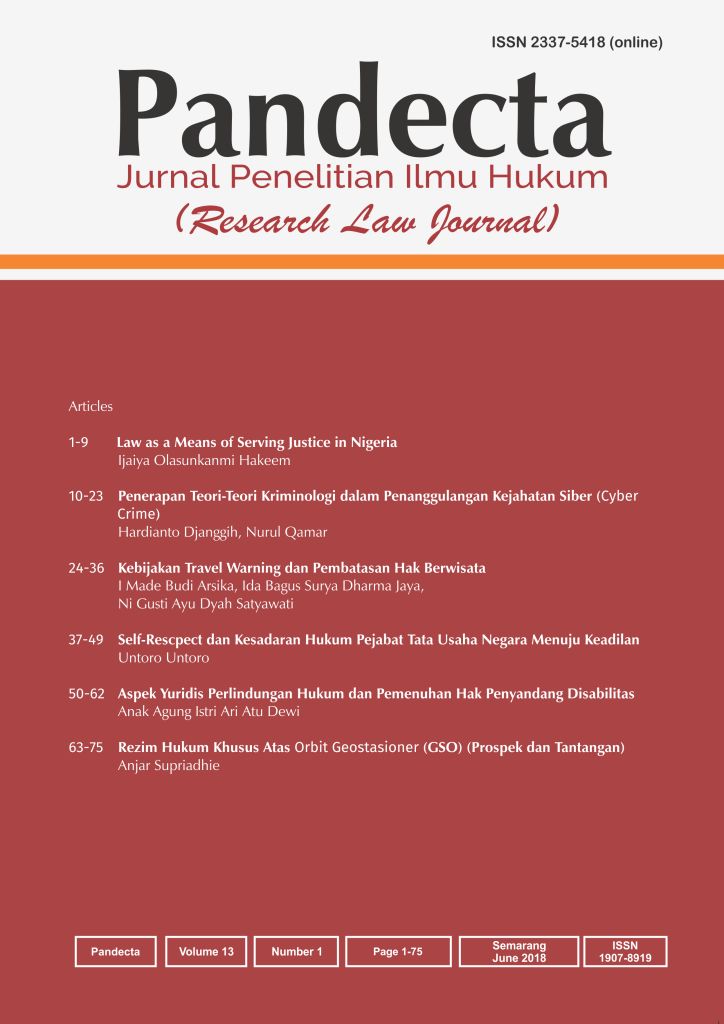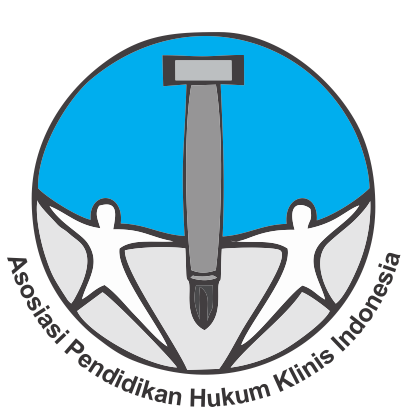The Other Laws di Era Otonomi Daerah (Studi Antropologi Hukum)
(1) Gedung C.4, Kmapus Sekaran, Gunungpati, Semarang, Indonesia
Abstract
Kondisi hukum di era otonomi daerah masih memberi ruang bagi the Other laws untuk hidup dan bahkan lebih dinamis, entah itu disebut sebagai folk law, customary law, local law, adat law maupun istilah lainnya. State law sebagai doktrin (ajaran) hukum yang berbeda dengan folk law sebagai fakta sosial yang tumbuh dari bawah dan terdapat di mana-mana. Penelitian ini bertujuan untuk menganalisis kelemahan state law serta potensi the other laws yang selama ini diterapkan oleh berbagai masyarakat. Sejalan dengan itu, akan dipaparkan beberapa pendekatan antropologi hukum yang pada dasarnya mengkaji hukum sebagai sebuah kenyataan yang diterapkan oleh masyarakat (law in action), termasuk prospeknya dalam “memotret†gejala hukum di era reformasi. Hasil penelitian ini menunjukkan bahwa norma-norma state law disahkan oleh teks resmi (oleh negara) berbeda dengan norma-norma folk law yang disahkan melalui ketaatan akan seperangkat kebiasaan. Norma-norma state law disatukan melalui asal mula logikal dari suatu norma dasar yang berbeda dengan norma-norma folk law yang disatukan oleh ketaatan di dalam suatu masyarakat. State law sebagai proses dari pengadilan negara berbeda dengan folk law sebagai proses penyelesaian sengketa di luar lingkup negara. Lalu dari proses sejarahnya pun kedua sistem hukum tersebut dapat dipisahkan, yakni yang state law lazimnya berasal dari pengambilan (sebagian atau seluruhnya) dari sistem hukum kolonial dan selanjutnya mungkin dikembangkan
The law conditions in the era of regional autonomy still allow room for the other laws to live and even more dynamic, whether it referred to as folk law, customary law, local law, or any other term. State law as doctrine (teachings) that the law is different from folk law as a social fact that grow from below and are everywhere. This study aims to analyze the weakness of state law as well as the potential of the other laws that have been adopted by various people. Accordingly, it will be presented some legal anthropological approach which basically examines law as a reality imposed by society (law in action), including its prospects in the â€picture†of law in an era of reform symptoms. The results of this study indicate that the norms of state law passed by the official text (by the state) is different from the norms of folk law that was passed through obedience to a set of habits. The norms state law combined with the logical origin of the basic norms that are different from the norms of folk who are united by obedience to law in a society. State law as the process of the courts of different countries with folk law as a process of dispute resolution outside the scope of the state. Then the history of the legal system, the two can be separated, ie, the state law typically comes from making (partial or total) of the colonial legal system and furthermore may be developed
Keywords
Full Text:
PDFReferences
Bachtiar, H.W. 1985. “Konsensus dan Konflik dalam Sistem Budaya Di Indonesia,†dalam Harsja W. Bachtiar (ed.), Budaya dan Manusia Indonesia. YP2LPM. Malang.
Bohannan, P. 1984. “Hukum dan Pranata Hukum†dalam T.O. Ihromi (ed.), Antropologi dan Hukum. Yayasan Obor Indonesia. Jakarta.
Dahrendorf, R. 1959. Class and Class Conflict in Industrial Society.Stanford University Press. California.
Hadikusuma, H. 1992. Pengantar Antropologi Hukum. PT. Citra Aditya Bakti. Bandung.
Hartono, S. 1993. “Kebijakan Pembangunan Hukum Menuju Sistem Hukum Nasional†dalam Analisis CSIS, Jakarta.
Ihromi, T.O. 2000. Kajian Terhadap Hukum dengan Pendekatan Antropologi. Catatan-Catatan untuk Peningkatan Pemahaman Bekerjanya Hukum dalam Masyarakat. Gramedia. Jakarta.
Keesing, R.M. 1992. Antropologi Budaya, Suatu Perspektif Kontemporer. Edisi Kedua. Terjemahan Samuel Gunawan. Penerbit Erlangga. Jakarta.
Koentjaraningrat (ed.), 1982. Masalah-Masalah Pembangunan, Bunga Rampai Antropologi Terapan. LP3ES. Jakarta.
Soehendera, D. “Tinjauan Buku Bronislaw Malinowski†dalam Antropologi No. 47, Tahun XIII, Juli-Agustus-September 1989.
Soekanto, S. dkk. 1984. Antropologi Hukum, Proses Pengembangan Ilmu Hukum Adat. Rajawali Pers. Jakarta.
Suparlan, P. 1980. Manusia, Kebudayaan dan Lingkungannya, Perspektif Antropologi Budaya. Prosiding Seminar Manusia dalam Keserasian Lingkungan. Pusat Studi Lingkungan Universitas Indonesia. 7 Februari 1980.
Tamanaha, B. 2000. A Non-Essentialist Version of Legal Pluralism. Jurnal of Law and Society 27(2).
Van Baal, J. 1988. Sejarah dan Pertumbuhan Teori Antropologi Budaya (Hingga Dekade 1970). PT. Gramedia. Jakarta.
Refbacks
- There are currently no refbacks.


